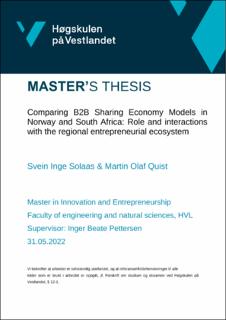| dc.contributor.author | Quist, Martin Olaf | |
| dc.contributor.author | Solaas, Svein Inge | |
| dc.date.accessioned | 2022-09-19T07:25:49Z | |
| dc.date.available | 2022-09-19T07:25:49Z | |
| dc.date.issued | 2022 | |
| dc.identifier.uri | https://hdl.handle.net/11250/3018674 | |
| dc.description | Masteroppgave i innovasjon og entrepenørskap.
Fakultet for ingeniør- og naturvitskap/ Mohnsenteret for innovasjon og regional utvikling/ Høgskulen på Vestlandet, campus Bergen. | en_US |
| dc.description.abstract | In recent years one has seen the rise of sharing economy models in the peer-to-peer market with platforms like Airbnb and Uber. However, in the business-to-business market the concept has not achieved a good foothold yet. Norwegian Catapult (Katapult, 2022) have in recent years opened five catapult centers across Norway to aid startup companies in the early phase of development where a B2B sharing economy model is central. These Catapult centres gave us a good model to do a deep dive into, to better understand how the Catapult in Bergen operates in its local entrepreneurial ecosystem. Through the INTPART project we also got the opportunity to do comparative research in the Gauteng region in South Africa to look at the similarities and differences with the model of The Council of Scientific and Industrial research (CSIR) and the Catapult.
In the literature chapter we introduce relevant theory that we used to form an interview guide, in this comparative case study we went with an explorative and thematic approach which made it possible to explore new ideas through the process of interviewing and analyzing. These methods made our research more agile and gave us the ability to alter the direction of our research without compromising legitimacy of the findings from the earliest interviews.
Both facilitators in this thesis have their own adaptation of the B2B sharing economy. The Catapult uses a decentralized version with focus on social capital and the CSIR is more centralized with a focus on human capital. Furthermore, we discuss the importance of tangible and intangible resources provided by the facilitators and how these centres fulfill the entrepreneurial ecosystem. Finally, we explore how the B2B sharing economy and the co-creation processes aid startups in the early phase of development. | en_US |
| dc.language.iso | eng | en_US |
| dc.publisher | Høgskulen på Vestlandet | en_US |
| dc.rights | Navngivelse 4.0 Internasjonal | * |
| dc.rights.uri | http://creativecommons.org/licenses/by/4.0/deed.no | * |
| dc.title | Comparing B2B Sharing Economy Models in Norway and South Africa: Role and interactions with the regional entrepreneurial ecosystem | en_US |
| dc.type | Master thesis | en_US |
| dc.description.localcode | INN599 | en_US |

